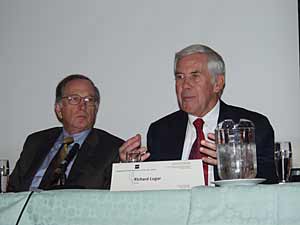
New Managing Director for Bellona Norway
The Board of the Bellona Foundation has appointed former Minister of Climate and the Environment Sveinung Rotevatn as Managing Director of Bellona No...
News

Publish date: June 11, 2002
Written by: Thomas Nilsen
News
Nobody has done more for securing radioactive material in Russia over the last decade than the two American Senators Sam Nunn (D) and Richard Lugar (Rep.). In the autumn of 1991, while the Soviet Union was on the brink of collapse, the two Senators took the initiative to establish an international co-operative effort to reduce the global threat from weapons of mass destruction held in the former Soviet Union. At that time, the administration of President George Bush was not supportive of Nunn and Lugar’s proposal to spend hundreds of millions of dollars on non-proliferation in the USSR. But Nunn and Lugar prevailed in pushing through the legislation in late November 1991, creating the programme named Cooperative Threat Reduction (CTR). President Bush signed the Nunn-Lugar initiative into law in December 1991, the last month of the existence of the Soviet Union.
$2 billion to nuclear security
Since the start in 1991, the United States has spent more than $2 billion through its CTR programme on dismantlement of nuclear missiles, submarines and securing fissile material. The programme also includes provision of financial support to approximately 20,000 former Soviet weapons scientists and engineers who have been given employment in research projects of potential benefits to the civilian economy. CTR has also initiated projects for securing Russia’s huge arsenal of withdrawn chemical weapons.
Most successful cooperation with Russia
Bellona argues that Nunn-Lugar’s CTR programme has been the most successful in the work of decommissioning of nuclear submarines in the Russian Arctic. Economical and technical support has been provided to the shipyards in Severodvinsk and the Nerpa shipyards at the Kola Peninsula. So far 21 strategic submarines are decommissioned with aid from the Nunn-Lugar programme. By 2007, this number will increase to 41.
Monday’s news on an al-Quaida terrorist’s plan to make and detonate a radiological bomb in the United States shows clearly the importance of the work on securing the various sites where radioactive material can be obtained. Around Russia, hundreds of sites with radioactive waste and different fissile materials have bad physical protection.
A threat with new aspects
The involvement of senators Sam Nunn and Richard Lugar against the proliferation of weapons of mass destruction should, in Bellona’s view, represent an example to be followed by other countries. The aftermath of September 11th has with clarity proved that terrorist groupings with relatively sparse resources are capable of creating massive security challenges to the world society.
When terrorist groupings such as Al-Quaida make plans for taking radiological weapons into use, the world must take the responsibility of securing these materials. Bellona refers to the initiative of Nunn and Lugar, which in a very explicit way demonstrates that decommissioning and environmental initiatives are two sides of the same issue. The best way to support this issue is to further acknowledge the work through awarding the Nobel Peace Prize to Sam Nunn and Richard Lugar.
The Nobel Committee positive towards issues of the environment
By awarding the Nobel Peace Prize to Nunn and Lugar, Bellona believes that other countries will improve their aid to Russia regarding security of radioactive materials. If that were to be the case, both world peace and the environmental battle would be considered winners.
Last year, the head of the Nobel Committee, Gunnar Berge, expressed himself in positive terms concerning the possibility to consider the criteria of the Nobel Peace Prize somewhat differently in the future.
— The Nobel Committee does not operate within a vacuum. We are subject to a constant influence from the society surrounding us. Global heating and increasing water levels seems to strike those already less fortunate. This may be the source of new conflicts. It is therefore only natural to more closely connect the two issues of peacekeeping and environmental battle, Gunnar Berge said to the Norwegian daily VG.
CTR programme
Richard Lugar is still in the position of Senator, whereas Sam Nunn withdrew from his position in 1996. Today Nunn is the chairman of the board of the centre for international studies in Washington, and spends much of his time on the organisation Nuclear Threat Initiative (NTI), which he founded together with the founder of CNN, Ted Turner. NTI works to prevent the dissemination of weapons of mass destruction, and focuses particularly on Russia.

The Board of the Bellona Foundation has appointed former Minister of Climate and the Environment Sveinung Rotevatn as Managing Director of Bellona No...

Økokrim, Norway’s authority for investigating and prosecuting economic and environmental crime, has imposed a record fine on Equinor following a comp...

Our op-ed originally appeared in The Moscow Times. For more than three decades, Russia has been burdened with the remains of the Soviet ...

The United Nation’s COP30 global climate negotiations in Belém, Brazil ended this weekend with a watered-down resolution that failed to halt deforest...